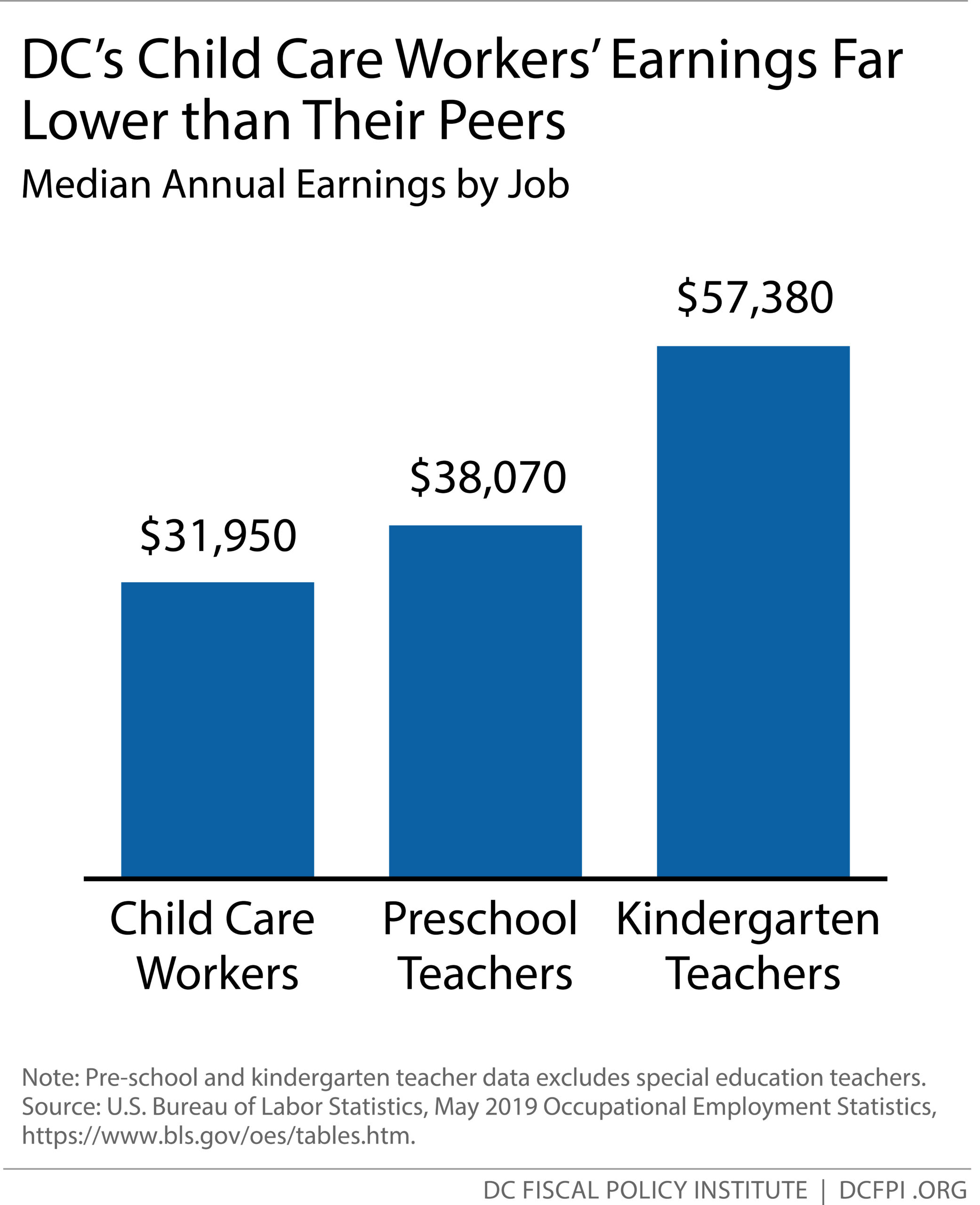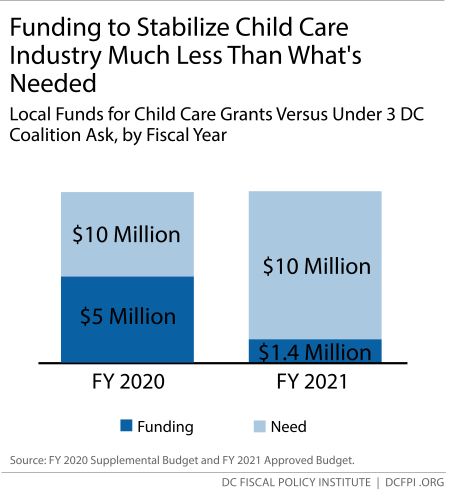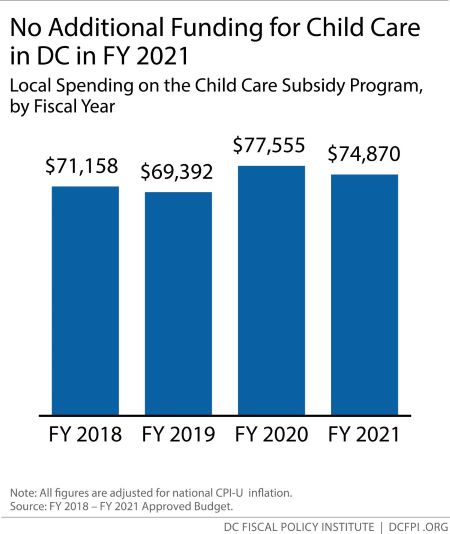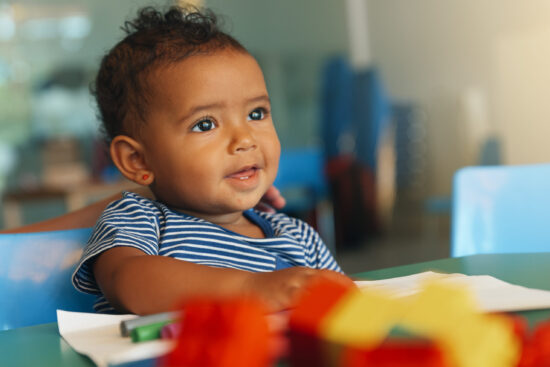- $6.4 million in emergency grant funding to stabilize the child care industry
- No additional funding for DC’s childcare subsidy program for children in low-income families
- No cuts to existing health programs to provide comprehensive supports to pregnant people and families with infants and toddlers
- Loss of $4 million intended for home visiting programs intended to provide supports for immigrant families and families experiencing homelessness
The FY 2021 DC budget represents lawmakers’ failure to adequately address the city’s child care crisis. For the first time, DC Council allocated no new funds in the child care subsidy program that supports low-income children. Over fiscal years 2020 and 2021, the Council allocated a total of $6.4 million in emergency grants to child care development centers, well below what is needed to stabilize the industry on the brink of collapse due to the COVID-19 pandemic.
For parents, especially those in low-wage jobs, the consequences of failing to fund a robust stabilization fund could be devastating as the city is at risk of permanently losing thousands of available child care seats.[1] It’s also a crisis for child care providers, the majority of whom are Black and brown women who were vastly underpaid even before the pandemic and are now facing unemployment as some centers are unable to re-open due to the high cost of complying with public health regulations.
Without significant public investments in child care, the city itself will be unable to recover from the crisis. Childcare is a critical part of our economy that helps parents work and supports healthy child development. If parents are unable to return to work without safe, affordable child care options, our city cannot have an equitable recovery.
Child Care Recovery is Critical to Racial Equity and the Economy
Black and Latinx communities—who are already bearing the brunt of COVID-19[2]—are at particular risk of losing access to child care. Even before the pandemic, families of color were less likely to have access to affordable high-quality care while childcare workers were underpaid and undervalued (Figure 1). Despite the necessity and difficulty of this work, caring for young children has long been an underpaid and undervalued profession.

Emergency Stabilization Grants Will Not Adequately Stabilize the Child Care Industry
Private pay and mixed-model[3] childcare providers lost at least two months of operating income from the pandemic-induced shutdown since March of this year and were largely left out of COVID-19 relief funding for small businesses or received insufficient amounts.[4]
The DC Council approved $5 million in emergency grant funding in the FY 2020 supplemental budget that the Office of the Deputy Mayor for Planning and Economic Development will be responsible for administering to qualified providers.[5]
Through partial repeal of an ineffective tax credit for high-tech companies, DC Council also approved an additional $1.4 million in emergency grant funding through Office of the State Superintendent of Education (OSSE) for FY 2021.[6] The total $6.4 million investment falls short of the ten million dollars the Under 3 DC coalition estimates is needed to pay educator salaries for an average classroom for two months of the shutdown (Figure 2).[7]

The devastation of this pandemic is unpredictable, and further shutdowns are likely. Without additional public support, many mixed-model childcare providers will likely be forced to permanently close their doors, exacerbating the District’s childcare shortage.
Child Care Subsidies Fall Short of Need
Affordable, quality early learning environments are instrumental to the well-being of young children. Access to high-quality, affordable early learning can reduce the difference in school readiness between low-income toddlers and their higher- income peers. Children who receive quality care also grow up to earn more money as adults.[8]
Fully investing in our childcare system is crucial to rebuilding and progressing toward a more equitable and thriving city. The Child Care Subsidy/Voucher program, administered by OSSE, provides families with vouchers that they can use at licensed providers, but the payments to early childhood education providers aren’t enough to cover the full cost of high-quality care.[9]
The Birth-to-Three for All DC Act, passed in 2018, aims to improve the quality of early education by offering competitive compensation for early educators and making childcare more affordable, among other crucial improvements to programs that boost child and parent well-being. The District has made some progress to implement this vision in previous years but invested no additional funding for DC’s childcare subsidy program this year (Figure 3).

Pre-COVID-19, the FY 2021 budget request from the Under 3 DC coalition was a $40 million enhancement to keep DC on the path to realizing the Birth-to-Three law. The funding request to the childcare subsidy was to raise educator pay, improve quality, expand subsidy participation by providers, and strengthen the financial stability of child care centers and homes.[10] After the pandemic hit, the coalition lowered its request, instead asking for a $10 million increase to the childcare subsidy program.[11] Ten million dollars is not sufficient to advance DC’s early childhood education system, but it would have helped subsidized providers comply with new health regulations so they can keep their doors open next year.

The coronavirus continues to disproportionately harm families with low incomes, particularly Black and brown families. Working families receive critical support from childcare providers who participate in the subsidy program. But subsidized providers will need more funding to implement pandemic-related public health measures over the coming year. Keeping children and families safe will require smaller class sizes, more staff, higher cleaning costs, and facilities adjustments, all during a time of fluctuating attendance.[12] Revenue is likely to decrease while expenses increase. It’s impossible to foresee exactly what each provider’s needs will be. Some may need to hire assistants to check temperatures, reduce class sizes, or assist children with hand-washing, while others may need the funds to increase crucial maintenance protocols such as regular professional cleanings.
Additional Federal Funding for Child Care Remains Uncertain
The Coronavirus Aid, Relief, and Economic Security (CARES) Act included an increase to Child Care and Development Block Grant (CCDBG) discretionary funds.
The District received approximately $6 million in CCDBG funds[13] which OSSE used to continue making subsidy payments to providers based on enrollment, rather than attendance, during the pandemic-induced shutdown.
DC Council passed a coronavirus relief bill that included an additional 5 percent of federal relief funds to childcare providers. Unfortunately, funding for this bill does not exist. The District will only be able to actually distribute these grants if it receives the $750 million the city was shortchanged when Congress opted to treat D.C. as a territory rather than state in handing out federal aid.[14]
Capital Budget Adds Funding for Additional Early Childhood Seats in DCPS
The approved budget invests $75 million in capital funding to add 540 new early childhood seats and 180 pre-kindergarten seats at several DCPS schools across the District.[15]While this is a strong investment—more quality seats are needed to support DC’s long-term early childcare ecosystem—the budget should also provide funding to address immediate needs to support the growing childcare shortage stemming from COVID-19.
Budget Sustains Funding for Perinatal and Early Childhood Health Supports
The Birth-to-Three Act includes several other provisions to advance healthy child development that were included in the approved budget. Lawmakers neither cut, nor sufficiently enhanced funding for each of these programs in FY 2021. When DC Council passed the law, the District’s Chief Financial Officer (CFO) released a fiscal impact statement (FIS) outlining the costs of each health program by year. The analysis below compares the FY 2021 funding to the CFO’s FIS to evaluate whether or not the current funding levels are adequate to keep the programs on track for full implementation.[16]
Healthy Futures
Healthy Futures is an evidence-based, early childhood mental health consultation program run out of the DC Department of Behavioral Health (DBH) that promotes positive social and emotional development in young children.
Mental health consultants provide in-classroom support to childcare providers in child development centers throughout the District, who then work with families to identify when their child might be at risk of—or display signs and symptoms of—social, emotional, or other mental health problems. Healthy Futures connects families to community-based services through direct referrals, if needed.[17]
The FY 2021 budget provided an additional $1.3 million for Healthy Futures, making the total funding level $2.8 million,[18] slightly below the approximately $3 million needed by FY 2021 in order to remain on track for full implementation, according to the CFO.
Nevertheless, the FY 20201 funding will allow Healthy Futures to deploy to 136 Community Development Centers, according to DBH.[19]

HealthySteps
HealthySteps integrates an early childhood specialist into every child’s primary care team. Because most young children visit the pediatrician, well-child visits present an important opportunity to ensure that families are equipped to address children’s needs.
The presence of a specialist in pediatric primary care connects families during and between well-child visits to provide support for common and complex concerns that physicians often lack time to address, such as feeding, behavior, sleep, attachment, and social determinants of health. At the same time, parents experiencing postpartum anxiety or depression can also receive support.[20]The FY 2021 budget is $750,000 for HealthySteps.
Help Me Grow
Help Me Grow connects expecting parents and families to resources they need to encourage positive maternal and child health. Help Me Grow helps families locate services such as prenatal and child developmental screenings, and links families to community-based support services.[21] The FY 2021 budget is $581,088 for Help Me Grow.
Home Visiting
Home visiting is defined by the DC Home Visiting Council as “a service delivery strategy that serves as a prevention and early intervention support for expecting parents and families of young children from before birth until kindergarten entry.” In these voluntary programs, trained home visitors and participants regularly meet in the home or another comfortable setting designated by the family. A key characteristic of these programs is that each one implements a model for addressing specific maternal, family, and child outcomes through education counseling, coaching, and other services. Home visitors also provide families with connections to community-based services and resources relevant to their goals.”[22]
Currently, 13 organizations implement 16 home visiting programs in the District. Seven of these programs receive local funding through the Child and Family Services Agency (CFSA) and the DC Department of Health (DC Health). The DC Council maintained level program funding for each of these existing programs in FY 2021.
In the approved FY 2020 budget, the DC Council allocated approximately $4 million to OSSE to serve two primary populations through home visiting: families experiencing homelessness and immigrant families. However, OSSE recalled its request for proposals for this funding due to the financial impact of COVID-19 and did not renew these funds in the FY 2021 budget.[23]

[1] Under 3 DC, “DC Can’t Have an Economic Recovery Without Child Care Investments,” May 12, 2020.
[2] Doni Crawford and Qubilah Huddleston, “The Black Burden of COVID-19,” DC Fiscal Policy Institute, April 16, 2020, https://www.dcfpi.org/all/the-black-burden-of-covid-19/.
[3] Mixed-model providers serve families who pay for subsidized care, as well as families who pay full tuition.
[4]Under 3 DC, “DC Can’t Have an Economic Recovery Without Child Care Investments,” May 12, 2020.
[5] Council of the District of Columbia, “Fiscal Year 2020 Revised Local Budget Emergency Act of 2020,” 23-763, July 21, 2020.
[6] Council of the District of Columbia, “Fiscal Year 2021 Local Budget Act of 2020,” B23-0761, July 7, 2020.
[7] Under 3 DC, Letter to Mayor Muriel Bowser on Emergency Relief for ECE and Families, April 3, 2020.
[8] Zero To Three, “Infant-Toddler Child Care Fact Sheet,” September 6, 2017.
[9] Office of the State Superintendent of Education, “Modeling the Cost of Child Care in the District of Columbia,” October 31, 2018.
[10] Under 3 DC, “DC’s Youngest Children Should Be a Top Priority in FY 2021 Budget,” January 16, 2020.
[11] Under 3 DC, “Pandemic Brings the Challenges of Child Care into Sharp Focus,” April 16, 2020.
[12] Office of the State Superintendent of Education, “Health and Safety Guidance for Child Care Providers: COVID-19 Recovery Period,” July 6, 2020.
[13] Kathleen Peterson, “COVID-19 Federal Funding Streams Available to the District of Columbia,” Office of the District of Columbia Auditor, May 8, 2020.
[14] Alex Koma, “D.C. created a $100 million business relief program. It doesn’t have the money to fund it,” Washington Business Journal, August 6, 2020.
[15] Council of the District of Columbia, “Fiscal Year 2021 Approved Budget and Financial Plan,” July 28, 2020.
[16] Jeffrey DeWitt, “Updated Fiscal Impact Statement – Birth-to-Three for All DC Act of 2018,” September 14, 2018, http://app.cfo.dc.gov/services/fiscal_impact/pdf/spring09/FIS%2022-203%20Birth-to-Three%20for%20All%20DC%20Act%20of%202018%20Enrolled.pdf.
[17] Under 3 DC, “Healthy Futures,” https://www.under3dc.org/wp-content/uploads/2020/04/U3DC-Factsheet-Healthy-Futures.pdf.
[18] Office of the Chief Financial Officer, “2021 RMO Department of Behavioral Health,” May 18,2020.
[19] Mark Levato, Email communication, “Confirming FY21 funding for Healthy Futures,” August 10, 2020.
[20] Under 3 DC, “HealthySteps,” April 2020.
[21] Under 3 DC, “Help Me Grow,” April 2020.
[22] District of Columbia Home Visiting Council, “2019 Annual Report of the District of Columbia Home Visiting Council,” July 2020.
[23] Qubilah Huddleston and Alyssa Noth, “Mayor’s Proposed Budget Falls Short of Stabilizing Child Care Sector,” DC Fiscal Policy Institute, June 4, 2020.
